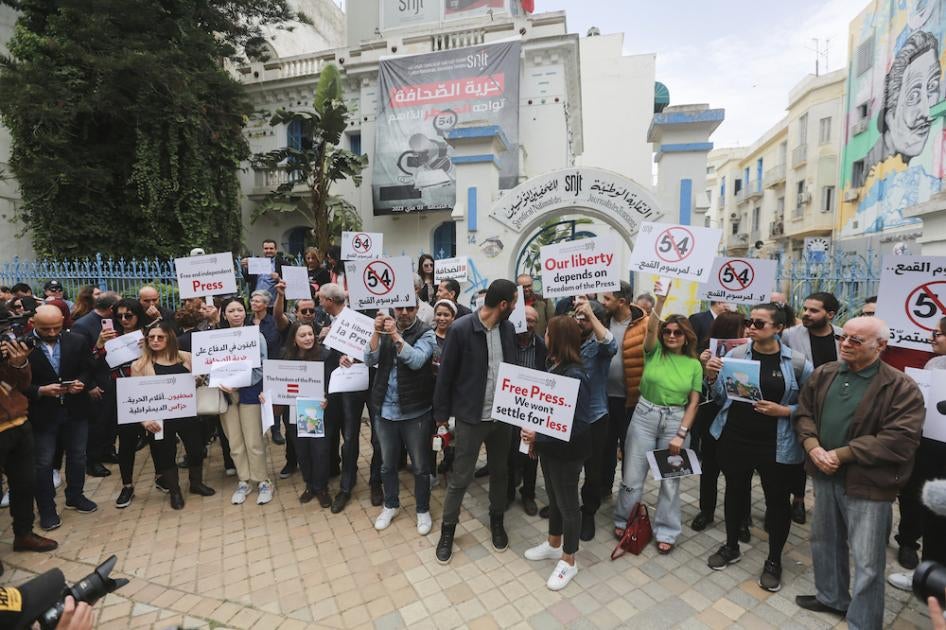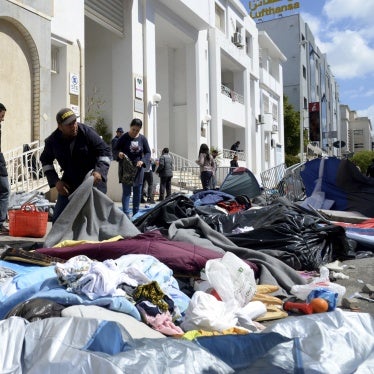(Beirut) – Tunisian authorities have ramped up their crackdown on media and freedom of expression in recent weeks, sentencing two journalists and a media founder to prison sentences, detaining another media figure, and intimidating private media, Amnesty International and Human Rights Watch said today. The authorities should immediately release those detained and drop all prosecutions for expression protected under international human rights law.
In the lead-up to Tunisia’s first presidential election since President Kais Saied’s July 2021 power grab, expected to be held in the fall, the Tunisian authorities have escalated their repression of free speech under Decree-Law 2022-54 on Cybercrime as well as other archaic laws. Simultaneously, they have clamped down on civil society groups, especially those defending migrants and refugees’ rights against the backdrop of the EU migration deal, leading to an unprecedented shrinking of civic space since the 2011 revolution.
“By attacking journalists and other media figures, Saied’s government is moving to put the last nail in the coffin of Tunisia’s civic space,” said Lama Fakih, Middle East and North Africa director at Human Rights Watch. “After undermining the judiciary, jailing several dozen opponents and critics and attacking civil society organizations, Saied is now targeting the media.”
“Tunisian authorities are methodically annihilating the last remaining gains of the 2011 revolution: freedom of expression and the press,” said Heba Morayef, Amnesty International’s Middle East and North Africa director. “Ahead of the elections, the government should ensure that all Tunisians are able to freely express their views without fear of retaliation, and that independent media are able to conduct their reporting free from harassment or intimidation and broadcast open discussions.”
Based on Human Rights Watch and Amnesty International’s count, over 70 people, including political opponents, lawyers, journalists, activists, human rights defenders, and social media users have been subjected to arbitrary prosecutions since the end of 2022. At least 40 remain arbitrarily detained as of May 2024, with most of them held in connection with the exercise of their internationally protected rights.
On May 22, the Tunis First Instance Court sentenced Borhen Bsaies and Mourad Zeghidi, both prominent journalists, to a year in prison under article 24 of Decree-Law 2022-54, in separate cases. The next day, the same court handed a media founder and tech activist a nine-month suspended prison sentence in relation to his online expression after detaining him for 11 days.
Tunisian security forces arrested Bsaies and Zeghidi separately on the evening of May 11. Based on the police report seen by Human Rights Watch and Amnesty International, Bsaies, who anchors two primetime talk shows on private TV and radio channels, was questioned about statements he made on the radio and on TV between 2020 and 2023, including comments on the dissolution of the High Judicial Council by President Saied in February 2022, among other topics. He was also questioned about social media posts that the police deemed to be critical of President Saied. Ghazi Mrabet, Zeghidi’s lawyer, said that police confronted him with nine video clips of statements made between February and April 2024, and they questioned Zeghidi’s Facebook post supporting an investigative journalist, Mohamed Boughalleb, who is serving a six-month sentence for publicly questioning a government ministry’s public spending.
On May 11, Sonia Dahmani, a lawyer and media commentator and Bsaies’ and Zeghidi’s colleague on the popular daily program “Emission Impossible” on the private radio station IFM, was also arrested under Decree-Law 2022-54. Dozens of masked plain clothes security forces stormed the headquarters of the Tunisian bar association and arrested her for sarcastic comments made on the private TV channel Carthage+ on May 7 questioning the claim that Black African migrants were seeking to settle in Tunisia. On May 13, an investigative judge in the Tunis Court of First Instance ordered her pretrial detention and on May 20 the same judge rejected a release request submitted by Dahmani’s lawyer. Dahmani is facing investigation in two prior separate Decree-Law 2022-54 cases for her public comments, based on complaints by the General Prison Directorate and justice minister.
Masked officers also attacked France 24 correspondents Maryline Dumas and Hamdi Tlili, who were broadcasting Dahmani’s arrest live, and broke their camera. Tlili was briefly arrested and beaten.
Decree-Law 2022-54 on Cybercrime, issued by President Saied in September 2022, violates the right to privacy and introduces harsh sentences for broadly and vaguely defined speech offenses. The authorities have frequently used article 24 of this decree to stifle dissent. Article 24 stipulates a five-year prison sentence and a fine of up to TND 50,000 (about US$16,000) for using telecommunications networks to produce, send, or disseminate “fake news” or “rumors;” to harm, defame, or incite violence against others; or to undermine public safety or national defense, spread fear, or incite hatred. The sentence is doubled if the offense targets a “public official or equivalent.”
Tunisian authorities should repeal Decree-Law 2022-54, along with vague or overbroad provisions of other existing codes that have been used to criminalize free expression, Amnesty International and Human Rights Watch said.
Indirectly referring to recent arrests, Saied said on May 15 in a meeting with his justice minister that “those who denigrate their country in the media ... cannot remain unaccountable and unpunished.” Between May 13 and 16, at least three representatives of private media outlets were summoned for questioning as part of various investigations, based on media reports. They include IFM’s director, who was asked about the radio station’s editorial line; Diwan FM’s editor-in-chief, who said he had been questioned about a comment made in 2020; and a Carthage+ executive.
In 2023, Zied el-Heni, a former “Emission Impossible” journalist, since fired, was arrested in June and again in December in two separate cases in connection with critical comments he made on the air. On January 10, 2024, he was sentenced to a six-month suspended prison term for “insulting” the trade minister under article 86 of the Telecommunications Code, his lawyer Ayachi Hammami told Human Rights Watch and Amnesty International.
Article 86 of the Telecommunications Code, which the authorities have long weaponized to stifle freedom of expression, carries a penalty of up to two years in prison.
Mohamed Boughalleb, another journalist, has been detained since March 22 for questioning the size of the religious affairs minister’s delegations during his official trips abroad on his Facebook page and on Carthage+ and Cap FM radio station in February and March, his lawyer, Anas Kaddoussi, told Human Rights Watch. On April 17, Boughalleb, who was sued by an official of the Religious Affairs Ministry, was sentenced to six months in prison for defaming an official under article 128 of the penal code. Since April 5, Boughalleb has been detained in a separate Decree-Law 2022-54 case also in connection with public statements, Kaddoussi said.
Similarly, journalist Chadha Hadj Mbarek has been detained since July 20, 2023, for her work for the digital content production company Instalingo. Hadj Mbarek, whose main role was to produce lifestyle content for a Facebook page, was accused of “undermining external security” under article 61-bis of Tunisia’s penal code, her lawyer, Malek Ben Amor, told Human Rights Watch.
The International Covenant on Civil and Political Rights (ICCPR), to which Tunisia is a party, protects the rights to freedom of opinion, expression, association, and peaceful assembly. Tunisia is also bound under the ICCPR and the African Charter on Human and Peoples’ Rights to respect the right to a fair trial.









